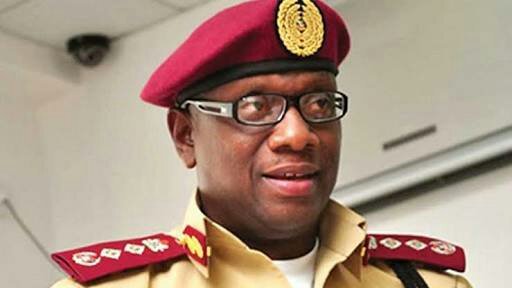Oyeyemi Cautions Erring Driving School Operators

The Corp Marshal, Federal Road Safety Commission (FRSC), Dr Boboye Oyeyemi cautioned driving school certificate racketeering, saying he will not spare anyone caught in the act as he called on members of the Driving School profession to appreciate the responsibility they own to the society through credible discharge of the tasks and upholding the ethics and standards of the profession.
Addressing members of the joint body of Association of Driving School Operators of Nigeria (ACDSON) and the Association of Driving School Instructors of Nigeria (ADSIN) during a national workshop on driving school with the theme; Promoting Road Safety through Quality Driver Education in Nigeria, held in Owerri, Imo state; the Corps Marshal urged participants to use the opportunity to critically examine how they can find new ways of improving on the quality of driver education and road safety in Nigeria.
The workshop which was declared open by the Executive Governor of Imo State, Owelle Rochas Okorocha ably represented by the Secretary to the State Government Mr George Ezenne Etche had in attendance, the Executive Governors of Anambra, Bayelsa, Enugu and Rivers states duly represented, Service Commanders from the Nigerian Army, Nigerian Airforce, Nigerian Police, NPS, NCS, NSCDC , other special guests and the participants.
In a statement by Bisi Kazeem, the Corps Public Education Officer, Oyeyemi said that it is expected that standards in the operations of driving schools would improve greatly with the deliberations from the workshop.
He stressed that the Corps needs the assistance and cooperation of all to succeed in the campaign by putting a firm check on this scourge threatening the security of lives and properties.
“ At moments like this, while imbibing new ideas, it is necessary to appraise the ongoing with the aim of seeing and correcting grey areas. He recalled that some driving school suspended from the portal for some time now due to sharp practices like illegally graduating trainees in less than the legally prescribed 26 mandatory hours, upload of vehicles in excess of the approved number to illegally increase intake, colluding with the inspection committee to re-register cars already registered in other states, illegal buy over or acquisition of registered driving school without formal transfer procedure approved by the Corps and many more” . He added.
Oyeyemi noted that the Corps has taken drastic step to first of all suspend the affected driving schools while investigation continued. He further stated that the Corps will soon round off investigations and any school fingered to have committed such will be prosecuted.
On the other hand, the Special Guest of honour, the Executive Governor of Imo state, represented by the Secretary to the State Government, applauded the initiative and commended the efforts of the
Oyeyemi led FRSC for ensuring sanity on the road through the introduction of the Driving School Standardisation Scheme, a guesture that will restore the lost glory of our roads.
In another development, The Corps Marshal revealed that 38% of all African road traffic deaths occur among pedestrians.
He made this statement while making a presentation in Dakar, Senegal on Non-Motorized Transportation (NMT) during the General Assembly of the West African Road Safety Organization (WARSO)
According to him, half of the world’s road traffic deaths occur among Motorcyclists (23%), Pedestrians (22%), Cyclists (5%), 31% of deaths among Car occupants and the remaining 19% among unspecified road users.
According to the Corps Public Education Officer, FRSC, Bisi Kazeem, quoting the reasons the Corps Marshal gave for the rate of deaths recorded among pedestrians and cyclists, “84% of the roads in low-income and middle-income countries where pedestrians are present carry traffic at 40 km/h and above and have no footpaths, however, where the footpaths exist, there is the concern of encroachment, truncation, abuse/misuse by motorist and lack of protective features that totally segregate pedestrians and prevent its usage by other road users”.
Other reasons he gave are that pedestrians have a 90% chance of surviving car crashes at 30 km/h or below, but less than a 50% chance of surviving impacts at 45 km/h or above. He also said that Pedestrians risk about 80% chance of being killed at a collision speed of 50 kilometres/hour (km/h), as opposed to a 10% risk at speeds of 30 km/h.
According to Kazeem, the Corps Marshal also noted that at a particular point in history bicycle in Nigeria was a mobility of pride, a dream come through for the lower class and a celebrated mode even for the “well to do” in the society, but the oil windfall of 1973 brought about prosperity especially for the working class and opened up the transportation space.
He also said that as more cars came in, bicycles began to disappear from the streets. Cars became spotlighted as symbol of strength, affluence and freedom, car owners now see those cycling and walking as less privilege, in turn those walking and riding bicycles now look forward to when to graduate from their mode.
As communities grew economically with provision of infrastructure, there was no corresponding growth in NMT infrastructure, promotion, law, policies and usage by the upper class. Buttressing this further, the Corps Marshal highlighted that Road Traffic Crashes (RTC) caused the Nigerian Economy about N3 billion annually, decrease air quality owing to exhaust fumes, increases urban noise pollution that causes exhaustion among other health implications, sustains increase in its carbon foot print, among many other effects.
Kazeem also quoted Oyeyemi saying that Traffic Congestions throw away about 3% of GDP of Organisation for Economic Cooperation and Development (OECD) countries to which Nigeria belongs. He added that the Corps has put in result yielding initiatives in place to promote NMT in Nigeria and the African sub-region. The initiatives are; Established National Stakeholders Committee on Bicycle Transportation, Designed the first ever, National Cycling Policy and Strategy in Nigeria and Presently working on the pedestrian manual.
More so, the Corps understudied 6 cities in 5 different countries with a view to domesticating best practices, established a non-motorised transportation unit to galvanise initiatives and to institutionalize them, Hosted Annual National Bicycle Week and won the 2013 Best Cycling Campaign award globally among 28 other participating countries.
Others are: Hosting of the United Nations annual World Bicycle Day (3rd June) on 4th and 5th June this year with cycling rallies in over 200 cities, Training officers of the Corps in Netherlands and in Nigeria through the Netherlands Fellowship, Promoting school cycling and competitions among students to enhance awareness, Mobilisation of the mass media to propagate cycling among others.
In his conclusion he stated that while there is a relative provision of infrastructure to cater for the need of pedestrians in our urban centres, the opposite is the case with cyclists Oyeyemi advised that bicycle lanes should be included on all urban roads in Nigerian cities, Trending down of urban motor vehicle speed to improve safety, Provision of bicycle parking facilities in every public premises and encourage their constituencies to ride bicycles.





